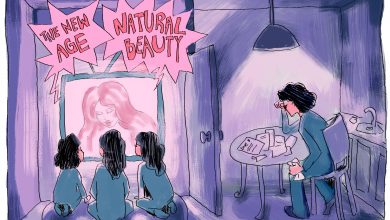The Politics of the Nuclear Family

Illustration by Jenny Dodge.
The link between capitalism and the oppression of women has been established beyond a doubt in the history of thought. This line of discourse can be found dispersed through the works of countless scholars and activists since the early nineteenth century, and it is well-founded in social disciplines.
Capitalism, as both an idea and as a material reality, currently structures the whole of society – including gender, sex, race, and class relations – and the way we think about these relationships.
The many faces of the contemporary oppression of women can all be traced to a foundation of neoliberalism: the reduction of bodies to property is a fundamentally capitalist idea. The patriarchy operates on the basis that women are property, that female bodies are objects to be owned, consumed, and controlled both for public and private enjoyment and use. We see this operating as oppressive misogyny almost everywhere: from rape culture to beauty standards as well as on an institutional level within state apparatuses like the medical-pharmaceutical industry complex.
To keep it simple, the patriarchy and capitalism are two heads of the same monster.
As such, the political and cultural status of women worldwide is inseparable from the neoliberal system. A feminism that ignores the patriarchal nature of capitalism is quite complicit with the oppression of women, as we see with liberal feminists in positions of power that contribute to the subjugation of women across the globe. Meanwhile, billions of women – particularly those in colonized countries exploited for neoliberal gains – remain in poverty.
A feminism that aims to liberate women and end misogyny must be intersectional, which would thus include an analysis of capitalism. A ‘feminism’ that is selective in its scope will never achieve true emancipation, and will inevitably perpetuate harm and exploitation.
In his seminal essay “Ideology and Ideological State Apparatuses,” twentieth century philosopher Louis Althusser maps out how organizational entities like governments, courts, police forces, churches, schools, and the family reproduce the capitalist power structure.
So how does the nuclear family fit into all of this? For the purposes of this article, the nuclear family is defined as a basic social unit, often consisting of a heterosexual couple and their children.
Apart from playing host to traditional patriarchal authority and high rates of domestic violence and sexual abuse against women and children, the family functions as a unit of consumption and as a system that normalizes a hierarchical structure, readying children to spend their lives toiling under an oppressive boss in order to buy commodities they don’t need.
Neoliberalism also relies on a patriarchal social organization in order to function at maximum efficiency. In other words, the family is constructed and organized by the capitalistic order, and consequently reproduces the gendered oppression inherent to capitalism.
But there’s more. Capitalism is always going to require more workers in order to keep running. This makes reproductive labor essential, and capitalism is such a devastating system because it alienates the worker from their labor, or process of production.
The way in which capitalism alienates the female worker from reproductive labor is by privatizing it within the walls of the family home. This refers to the separation of human reproduction from the social sphere, or the “privatization” of childbirth within the family.
As twentieth century philosophers Gilles Deleuze and Felix Guattari write in the prolific “Anti-Oedipus,” this “placing of the family outside the social field…is the condition under which the entire social field can be applied to the family.” In other words, the effect of the privatization of reproductive labor is such that the nuclear family becomes a template for the determination of capitalism. As Deleuze and Guattari point out, the family acquires the roles of father capital, mother earth, “and their child the Worker”- just as money drives the perpetual exploitation of the planet and its natural resources for profit.
The nuclear family is a trap for the woman to become the most alienated laborer with the most invaluable labor. Liberation requires the seizure of labor and the means of production. For women, this means that social reproduction must be deprivatized: abolish the traditional nuclear family.
The ownership of reproductive labor is where power lies. This does not mean that we need to all start rearing children collectively or stop giving birth altogether to free ourselves. Instead, I want to show how we may unknowingly participate in our own oppression, and consequently, how we may knowingly participate in our own liberation.
With our current political structure, an end to oppression is synonymous with an end to capitalism and all of its institutional faces. As feminists, we can and must find new ways to establish love and community outside of a traditional marriage and family life. We must collectivize and struggle in solidarity against the systematic subjugation of all people to a financial order.
If you wish to familiarize yourself in depth, introductory texts to examine include Silvia Federici’s “Caliban and the Witch” and “Revolution at Point Zero.”




